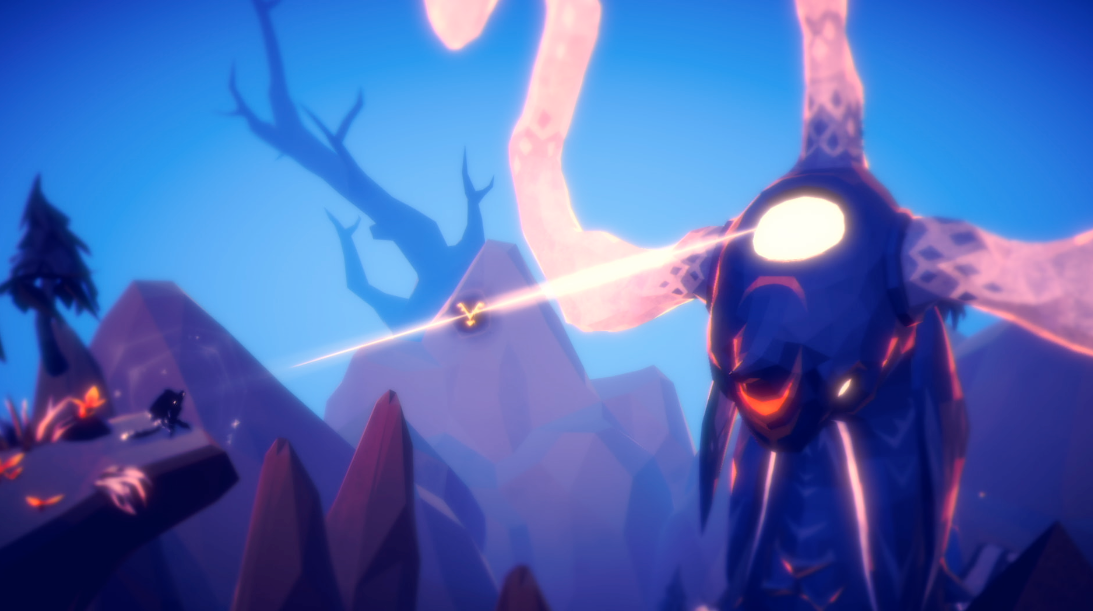In Fe, your most powerful tool is your voice. You, a small fox-like creature, can use your songlike call to befriend other animals, open up new pathways in the environment, and distract the game's mechanical enemies. But you also have to know when to stay quiet and silently read the signals of the other forest animals around you. Communication, and the connections between living things, are at the heart of Fe's gorgeous woodland world. That world is a delight to explore, and though the act of exploration never builds to something greater, it's a captivating and often melancholic look at our relationship with nature.
Fe drops you in the forest all alone, with no clear purpose or direction. You can communicate using a garbled, baby-talk sort of call, and you're given one small bit of instruction as you begin to wander the ethereal forest: "Sing gently with animals." The harder you press the trigger, the louder you'll "sing," and you have to strike the right note to communicate with the different species around you.
Each species' unique song has its own use; certain plants respond to birds' calls, while others only open for deer's voices. In addition to being absolutely adorable, a baby salamander's chirp will open up a pink flower you can bounce on to get to high-up areas. Animals you befriend will follow you around, and their songs will give you access to places you couldn't reach alone. You need to work with the other animals--and eventually learn their various "languages"--to traverse the forest.
Exploring in Fe is very much a give-and-take. Early on, you can't get anywhere without the help of another animal, but typically, those animals (or the plants they interact with) are leading you to others who need help. In one of the most memorable parts of the game, following a deer through the woods will lead you to a giant deer struggling against its chains. You have to sneak your way past machines patrolling the area, destroy the machines' webs to break the chains and release the deer, and carefully climb the deer to communicate with it. The climb itself is breathtaking, as you're jumping from tree to tree growing along the deer's sky-scraping body, but the stillness afterward, when the deer teaches you its call as thanks, is stunning in its own way.
Those moments of peace--by way of the harmonies you've made with other creatures--are shattered quickly and easily by Fe's inorganic enemies, whose harsh industrial lights and abrasive noises pierce the solemn orchestral music of the forest. If they spot you, you have to find somewhere to hide and fast, or you'll be caught in their webs. It's not hard to stay stealthy and save yourself, but you'll end up watching at least once as the friendly animals you had in tow get captured one by one--and it's heartbreaking.
Fe is hauntingly beautiful, and as a result, it often doesn't feel like the relatively simple platformer-adventure game it is. Like a lot of similar games, you collect items--in this case, pink crystals--around the world to unlock new abilities. But finding those crystals is more a consequence of following other animals and seeing where the flora and fauna take you, not a primary goal or even a strictly necessary one. Only two unlockable skills, climbing trees and gliding, are required to finish the game, and you'll find enough crystals to get them in the first hour or so as long as you follow the surprisingly linear routes in front of you.

The simplicity of Fe's mechanics becomes more apparent sometime after helping the giant deer. There's a distinct pattern: Save some animals, learn their call, and use that call to turn flowers into different kinds of platforms so you can move on to the next section. Very rarely does what you learned before come in handy again later in creative or surprising ways, even after you've learned every song. While this leaves room for you to think about the greater meaning behind what you're doing--rather than the discrete objectives in your path--it's disappointing that the skills you learn from each species never meaningfully combine, especially when the connections you make with each of the living things around you are so important at first blush.
But despite being one-note on a gameplay level, Fe's world, with its lush environments and wistful score, compels you to explore. Establishing fleeting connections with the creatures around you is both charming and a little sad, and learning the truth about the enemy machines is even more tragic. By the end, the most important thing you've learned is how to connect with nature, not just by singing with animals but by understanding the world around you.



















